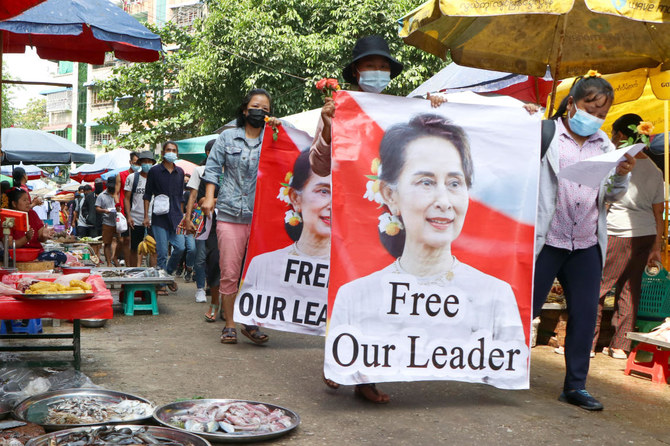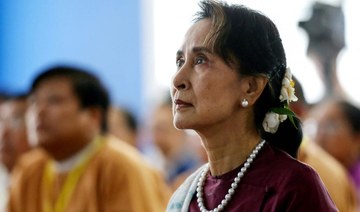BANGKOK: Ousted Myanmar leader Aung San Suu Kyi went on trial Monday in a new corruption case against her, alleging she took $550,000 in bribes from a construction magnate.
She is charged with two counts under the country’s the Anti-Corruption Act, with each count punishable by up to 15 years in prison and a fine.
Suu Kyi has been detained since the army ousted her elected government in February 2021 and has not been seen or allowed to speak in public since then. She is being tried in closed sessions and her lawyers cannot speak publicly on her behalf or about her trial because of a gag order placed on them.
She has already been sentenced to 11 years’ imprisonment after being convicted of illegally importing and possessing walkie-talkies, violating coronavirus restrictions, sedition and another corruption charge.
Suu Kyi’s supporters and human rights groups have said the cases against her are an attempt to discredit her and legitimize the military’s seizure of power, eliminating the possibility of her taking part in a possible 2023 election.
But widespread resistance to the army’s takeover has resulted in what some UN experts have characterized as a civil war, challenging the military’s ability to govern.
Monday’s opening of Suu Kyi’ latest trial was confirmed by a legal official, who spoke on condition of anonymity because he was not authorized to release information.
In this latest case, she is accused of receiving money in 2019 and 2020 from Maung Weik, a tycoon who previously was convicted of drug trafficking. State television under control of the military government last year showed a video in which Maung Weik claimed to have given cash payoffs to government ministers to help his businesses.
Ye Htet, an official from the Anti-Corruption Commission who is a plaintiff in the case, gave testimony in Monday’s proceedings, said the legal official, who said payments Maung Weik made in 2019 and 2020 were being treated as separate counts.
The Global New Light of Myanmar, a state-controlled newspaper, reported in February the official charges that Suu Kyi in her position as state counsellor — the country’s de facto chief executive — received $550,000 in four installments in 2019-2020 “to facilitate the business activities of a private entrepreneur.”
Maung Weik in his statements in state media last year said he gave the money from 2018 to 2020. He said in his video that the money included $100,000 provided to Suu Kyi in 2018 for a charitable foundation named after her mother and also gave Suu Kyi $450,000 in payments from 2019 to 2020 for purposes he did not specify.
Under Suu Kyi’s government, Maung Weik won a major development project that included the construction of houses, restaurants, hospitals, economic zones, port and hotel zones in Myanmar’s central Mandalay region.
Maung Weik, as chairman of a property development company, was close to some of the generals in power during a previous military-run government. He was sentenced to 15 years in prison in 2008 for drug trafficking and was released in 2014 under a semi-democratic transitional government led by former generals. After his release, he returned to doing business with former generals.
Overall, Suu Kyi has been charged with 12 counts of corruption. She was convicted last week on one corruption charge and given a five-year prison sentence after being found guilty of receiving $600,000 and seven gold bars from Phyo Min Thein, the former chief minister of Yangon, the country’s biggest city.
Her lawyers are trying to overturn the verdict in an appeal to the Supreme Court on technical grounds, saying the case should not have been heard. If that is rejected, they can still make another appeal.
Myanmar’s Suu Kyi charged with bribery as new trial opens
https://arab.news/5httj
Myanmar’s Suu Kyi charged with bribery as new trial opens

- Suu Kyi has been detained since the army ousted her elected government in February 2021 and has not been seen or allowed to speak in public since
- She has already been sentenced to 11 years’ imprisonment after being convicted of illegally importing and possessing walkie-talkies, violating COVID-restrictions and sedition
Four cops killed as separatist militants launch ‘coordinated’ attacks in Pakistan’s southwest — police

- The attacks began in Balochistan’s capital of Quetta at around 6am with a powerful explosion, followed by intense gunfire
QUETTA: Separatist militants, affiliated with the Balochistan Liberation Army (BLA), have launched “coordinated” attacks in several cities of Pakistan’s southwestern Balochistan province and killed at least four policemen, officials said early Saturday.
The attacks in the provincial capital of Quetta began at around 6am with a powerful explosion, followed by intense gunfire that lasted for two hours along with multiple explosions.
Residents of Dalbandin and Nuhski said they heard explosions and gunfire in the districts early Saturday morning, while there were reports of similar attacks in Mastung, Gwadar, Pasni and Turbat.
A senior police official, who requested anonymity, told Arab News that the militants attempted to enter the provincial capital of Quetta but police and other law enforcement agencies stopped them.
“The terrorists attacked a police mobile at Sariab road which resulted in the killing of two policemen,” he said. “Police and other law enforcement agencies denied space to the terrorists in Quetta city and a clearance operation is still going on.”
Balochistan, which borders Iran and Afghanistan, is the site of a decades-long insurgency waged by Baloch separatist groups who often attack security forces and foreigners, and kidnap government officials.
Shahid Rind, the Balochistan chief minister’s aide for media and political affairs, said police and paramilitary Frontier Corps (FC) had foiled the attacks and were chasing the assailants.
“After the killing of more than 70 terrorists at different places in Balochistan in the last two days, terrorists have attempted to attack at a few places in Balochistan, which have been foiled by timely action by the police and FC,” he said on X.
“At present, the pursuit of the fleeing terrorists is underway. More details will be revealed very soon.”
In a statement issued on Saturday, BLA said the group had launched ‘Operation Herof 2.0,’ which included a series of attacks in multiple cities of Balochistan.
Saturday’s attacks follow coordinated attacks carried out by the group in Aug. 2024 in various districts of Balochistan which killed dozens of people.
The separatists accuse the central government of stealing the region’s resources to fund development elsewhere in the country. The Pakistani government denies the allegations and says it is working for the uplift of local communities in Balochistan.
Pakistan Railways has suspended train service from Balochistan to other parts of the country for a day, following Saturday’s attacks.
“Quetta-Peshawar bound Jaffar Express, and Quetta-Chaman passenger trains have been canceled due to the prevailing security situation in Balochistan,” Muhammad Kashif, the railways controller in Quetta division, told Arab News.
At least four police officials in as many districts confirmed to AFP the situation was not completely under control yet.
“At least four policemen were killed in Quetta alone,” he added, speaking on condition of anonymity as he was not authorized to speak to the media.
A senior military official based in Islamabad confirmed the attacks, adding they were “coordinated but poorly executed.”














